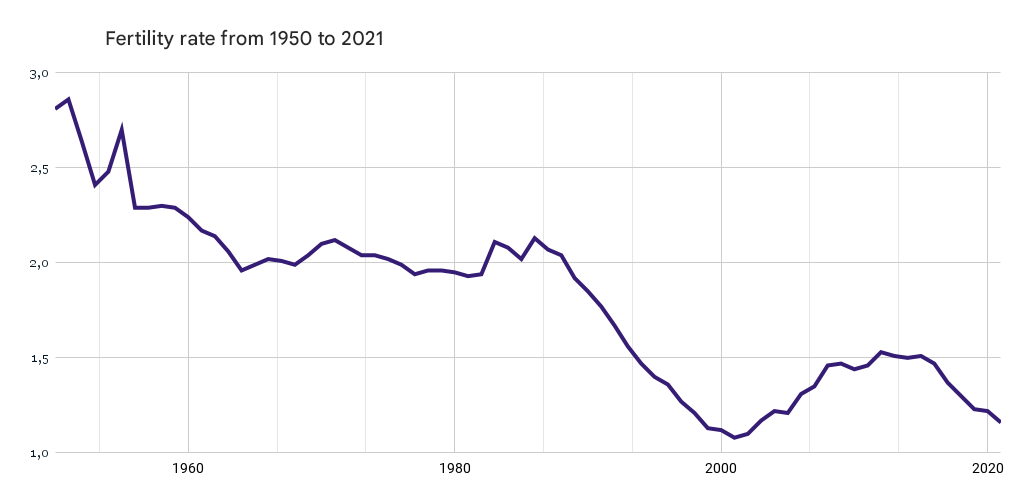It seems that some Ukrainians lack the thrill of the moment. How else can we explain the emergence of initiatives such as the introduction of taxes on childlessness among Ukrainians, which recently outraged society?
Obviously, there is a demographic problem. It was relevant for our country long before the war, and now it has turned into a real catastrophe. The last time the fertility rate (as scientists call the average number of children born to one woman) was above 2 was recorded during the baby boom of 1983-1988. Since then, the rate has mostly been decreasing and in 2021, against the backdrop of the pandemic, it fell to 1.16.

Data - State Statistics Service and archival data. Graphics - Unex Bank
Emigration, the death of heroes and civilians due to war, low birth rates – you can’t imagine a worse situation for the country’s demography. Therefore, it is probably not surprising that some people from time to time are visited by super-ideas on how to get out of the population decline crisis. While these thoughts are the subject of a closed discussion between two godfathers, there is nothing alarming in them. When they are embodied in legislative initiatives – society takes a breath.
Money is useless here.
In fact, there is nothing wrong with stimulating the birth rate. Much more difficult from an ethical point of view are initiatives of the opposite meaning, when the state undertakes to limit the birth rate. Especially for certain categories of the population. But it is one thing when a system of incentives is built through encouragement, another when prohibitions and fines are used.
Although, I must admit, even stimulating measures, in the form that most states are trying to implement, work extremely poorly. Because children are not about money.
Yes, raising children requires finances. And the state, if it is even slightly concerned about the demographic situation, should provide assistance to parents. But money alone will not solve the birth rate issue.
Every mother currently in Ukraine can talk for hours about why she is not ready to give birth to a second or third child. Not even because of the war itself – obviously, this factor dominates absolutely. But because of uncertainty about the future.
Will she be able to feed her, will she be able to clothe her? Who will take care of the baby while she is forced to go to work after a month or two or three of maternity leave? Will her employer wait for her? Will she find a job quickly, having a minor child?
The child grows, and the problems grow with it. Which kindergarten should I send him to? Which school and at what cost should I send him to study? And how will the athlete grow, where will he have a chance?
A child is the future. When deciding to have a first child, a family can prioritize and solve its own “instinctive-egoistic” request. However, it very quickly understands the basic truth. We all want to see our own children successful, happy, smart and smiling. But the model of our life, our vision of the future limit the likelihood of having a child. And money has nothing to do with it.
Invest in happiness
Moms who have found themselves abroad with their children will tell you even more. Because they have already seen and felt how it could be different. Their preschoolers return from kindergartens dirty from head to toe. But happy. Their schoolchildren are inspired to create interesting projects at home: they program, construct, sew, design, calculate and model. Instead of boring homework and cramming.
I do not want to devalue public education in Ukraine at all. It is strange by European standards, but not hopeless. It can be adjusted, reformed, made to meet the demands of the future, which will come tomorrow. It is much more difficult to fix a system that does not value the work of teachers and educators. No matter how much you borrow world experience, no matter how much you prepare methodological materials, a demotivated teacher with a meager salary will not light up the eyes of students. So let's add another “extremely fair” tax that will “cover” teachers as well.
To increase the birth rate, we need to invest in happiness. In the broadest sense. The happiness of parents who don't think about what they will feed their children tomorrow if one of them loses their job. Where to run and where to get money if a child ends up in the hospital. In the happiness of educators and teachers, the happiness of doctors who will have both respect from society and a decent salary. And, as a result, in the happiness of children who return from kindergarten and school inspired every day.
Children who, every time they return from class, "now for sure" know who they want to become. Because today they learned something extraordinary.
And about science
Debates and research on stimulating fertility have been going on for many years. But scientists agree that purely economic incentives, like all kinds of prohibitions, are ineffective.
“The best demographic goal a country can set is to ensure that every pregnancy is planned and every birth is safe. Around the world, we see governments trying to manage demographic trends by encouraging fertility or, conversely, reducing subsidies. Such policies are not only ineffective, but also risk violating human rights.
Instead, policymakers should empower people to take responsibility for their own reproductive choices by ensuring access to contraception and sexual health information, creating health systems that allow people to have children safely, and supporting family life through subsidized childcare and affordable housing.
"We have seen time and again how investments in family planning and reproductive choices pay dividends, improving children's health and enabling women to get an education, find and keep better jobs, hhttps://www.weforum.org/agenda/2023/01/davos23-policies-demographically-diverse-world/elp increase household incomes, lift families out of poverty and accelerate economic growth", said a report by Natalia Kanem, Executive Director of the UN Population Fund, presented at the World Economic Forum in Davos last year.
It generally identifies 5 key areas of demographic policy that will bring the greatest benefits to population growth:
1. Collection and analysis of population data
Understanding how and where the demographic situation is changing in the country, what needs the population has, and finding solutions to meet these needs (existing and future) will prepare society for demographic changes.
2. Investment in family planning and reproductive choice
Creating a health care system that allows for safe childbirth. As well as subsidizing childcare and creating programs that make housing more affordable for families.
3. Planning for future healthcare infrastructure needs
Investing in the training of doctors, preparing not only for the immediate but also for the future medical needs of society.
4. Learning. For everyone. At any age.
Not only children can study. But also women/men who interrupted their studies to have children. Or have to retrain to look after them. Or, if the country has to attract migrants to increase the population, to be able to educate them and their children.
5. Inclusivity.
The policy that works best is the one that involves the largest number of people in the economic or social sphere of the country. So that it is easier for women to remain in demand in the labor market. So that people of respectable age remain healthy and economically independent of the youth, without burdening their children. So that young people are in demand in the labor market regardless of gender and the presence of minor children, and can give birth without fearing for tomorrow.
This is not just the opinion of a randomly selected expert, these are conclusions supported by data from hundreds of national-scale experiments, often much more staggering and inhumane than a 1.5% tax on childlessness. As we can see, among these recommendations there is no mention of direct economic incentives for fertility. Not to mention additional taxation.
Because children are born not for money, not for the future of a particular country. But for happiness: your own happiness to have children and the happiness of your children in the future.










